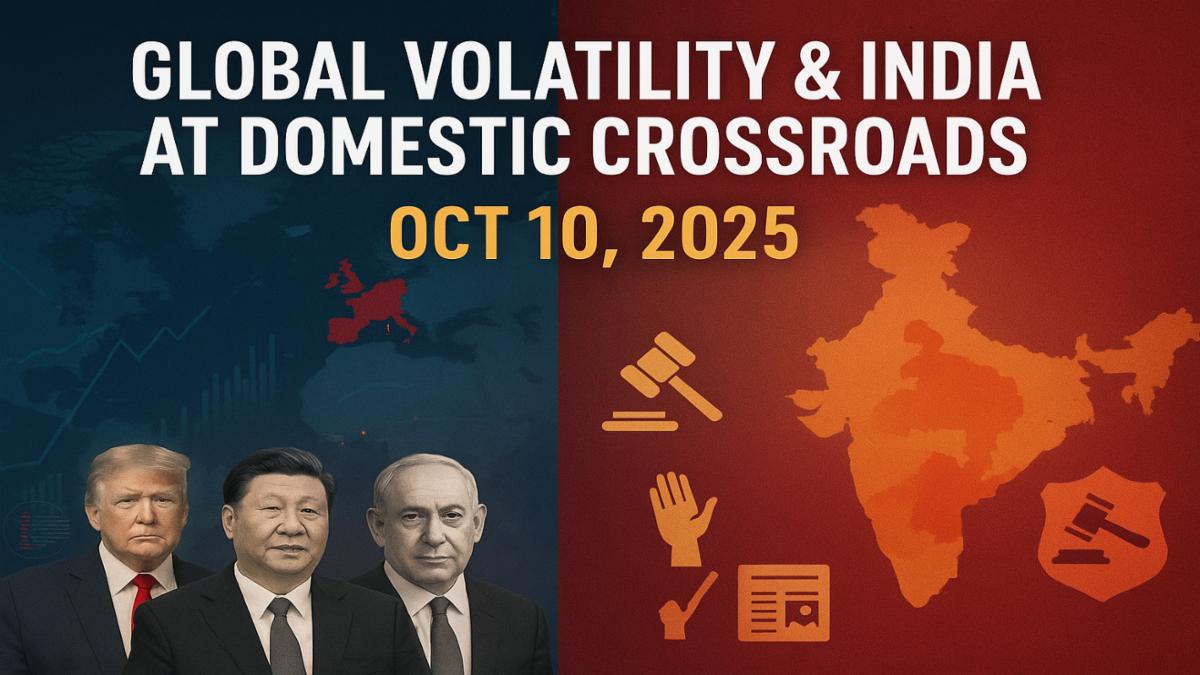Article Body
Global Uncertainty and Domestic Crossroads: India and the World on October 10, 2025
The world witnessed an unusually turbulent day on October 10, 2025, as global and domestic developments converged to create a complex tableau of uncertainty. From Washington D.C. to Gaza, and from New Delhi to Kerala, leaders, citizens, and institutions grappled with volatility, fragile agreements, and evolving public sentiment.
Global Flashpoints: U.S., China, NATO, and the Middle East
In the United States, President Donald Trump took decisive steps that sent shockwaves across international diplomatic and financial landscapes. Announcing a “massive increase” in tariffs against China and questioning any further meetings with President Xi Jinping, Trump’s rhetoric underscored a transactional, unpredictable approach to global governance. The President further strained alliances by publicly criticizing Spain for lagging on NATO defense spending, amplifying concerns about cohesion within the Western military bloc.
Adding another layer of uncertainty, Trump made an unscheduled visit to Walter Reed National Military Medical Center for a semiannual physical, prompting speculation about his health and stamina. Analysts suggest that this combination of aggressive foreign policy posturing and personal opacity has heightened global market volatility, forcing both allies and adversaries to navigate a new strategic uncertainty.
Meanwhile, the Middle East remained on a knife’s edge. A tentative ceasefire in Gaza is supported by an international coalition, including 200 U.S. troops and contributions from Egypt, Qatar, Turkey, and the UAE. Yet, Israeli Prime Minister Benjamin Netanyahu’s public declaration to resume hostilities if Hamas fails to comply with disarmament measures has transformed the peace effort into a fragile, conditional arrangement. Observers warn that any violation could place the multinational forces in immediate jeopardy and risk renewed conflict.
Central and South Asia also saw escalating tensions. Afghanistan accused Pakistan of launching airstrikes on its territory, while Islamabad vowed retaliatory measures against militant groups operating near the border. These events highlight the persistent instability in the region and the potential for rapid escalation if diplomatic mechanisms fail.
India at a Domestic Crossroads
Within India, October 10 brought its own series of challenges. High-profile corruption raids in Madhya Pradesh and West Bengal exposed systemic issues in governance and accountability. In Kerala, a landmark High Court ruling on Waqf property is expected to have far-reaching legal and political ramifications nationwide, potentially reshaping interpretations of land ownership and religious endowments.
Public dissent is also evolving. While longstanding insurgencies such as the Maoist movement appear to be waning, new coalitions of protest and advocacy are emerging. These fluid, issue-based movements unite diverse ideological groups, creating fresh challenges for authorities in balancing civil liberties with law and order.
Institutional trust faced severe tests as reports of police misconduct surfaced from multiple states, including horrific allegations in Bhopal and politically linked abuse cases in Himachal Pradesh. Systemic failures, including a prison break in Tripura and professional lapses in Odisha police operations, underscore the broader crisis of confidence in law enforcement.
Strategic Alignments and International Engagement
India’s foreign policy continued to reflect a nuanced balancing act. Strategic military integration with the United Kingdom, particularly in maritime operations, signals alignment with Western powers in the Indo-Pacific. However, U.S. sanctions on Indian companies serve as a reminder of the economic and political pressures influencing India’s pursuit of strategic autonomy.
Taken together, the day’s events illustrate a world and a nation grappling with volatility, institutional fragility, and shifting power dynamics. From personalized diplomacy in Washington to fragile ceasefires in Gaza, and from legal upheavals in Kerala to corruption scandals in Madhya Pradesh, the global and domestic environments remain deeply interconnected and unpredictable.
Conclusion: Navigating Uncertainty
October 10, 2025, is emblematic of an era defined by uncertainty. Global leaders must adapt to personalized, sometimes opaque, decision-making styles, while domestic authorities in India face mounting scrutiny over governance, legal frameworks, and public trust. For citizens, analysts, and policymakers, the challenge is clear: navigate a world where volatility is the norm, and stability is increasingly contingent on both institutional resilience and individual agency.


Comments